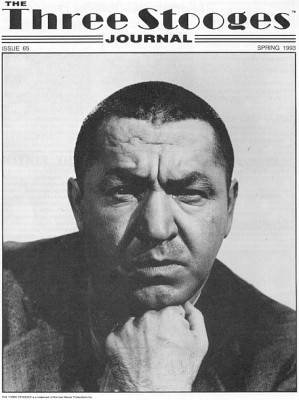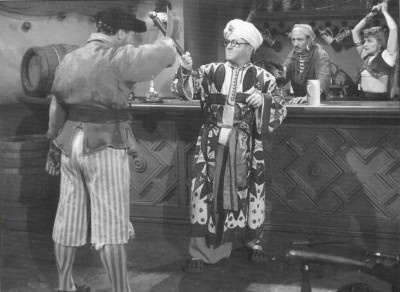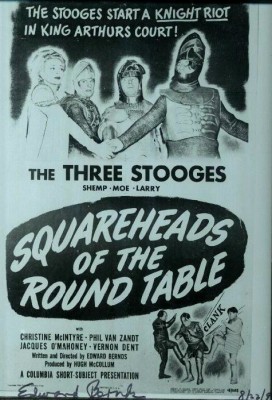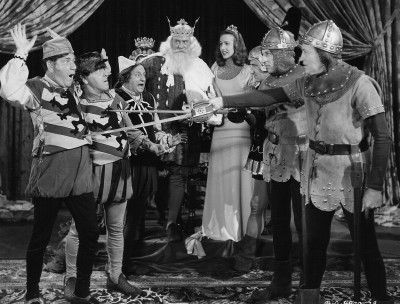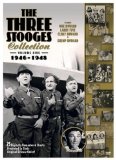| Reviews & Columns |
|
Reviews DVD TV on DVD Blu-ray 4K UHD International DVDs In Theaters Reviews by Studio Video Games Features Collector Series DVDs Easter Egg Database Interviews DVD Talk Radio Feature Articles Columns Anime Talk DVD Savant Horror DVDs The M.O.D. Squad Art House HD Talk Silent DVD
|
DVD Talk Forum |
|
|
| Resources |
|
DVD Price Search Customer Service #'s RCE Info Links |
|
Columns
|
|
|
Three Stooges Collection - Volume Five - 1946-1948, The
When Curly abruptly vanished from the climax of Half-Wits Holiday (1947) and was replaced with Shemp, initially the idea was that Curly would eventually return. But it was not to be. Curly died in 1952, while Shemp remained with the Stooges until his death three years later.
Shemp's return to the Stooge fold after a 15-year absence (Shemp being the original "third stooge" in the pre-Columbia days with Ted Healy) gave the series a big, BIG shot in the arm. Though still saddled somewhat with the patsy pole-position, Shemp made no attempt to imitate Curly, and was frequently hilarious in his own right, as he often was in the solo appearances he made in films of all kinds in the years between. As others have pointed out, the irreplaceable Curly was a one-of-a-kind comedian, but it's hard to imagine him playing anything other than Curly of the Three Stooges. Shemp, on the other hand, was a fine actor who'd already carved a niche for himself as a character comedian in feature films as well as shorts, supporting a wide range of films.
Volume Five offers 25 more shorts - more than seven hours worth - though surprisingly just six of these are new to DVD (two Curlys, four Shemps). Still, the transfers are up to the same high standards of Volumes One and Two, Three, and Four. And even though this collection includes some of the most dire, unfunny Curly shorts, they're still perversely fascinating to watch: Until now, it was almost impossible to see them chronologically (though some were originally released in a different order than they were produced) so here, largely for the first time, the Stooge fan can trace Curly's fall and Shemp's rise.
An alarmingly ill-looking Curly in the mid-1940s.
Beer Barrel Polecats (1946)
Curly's decline and the sharp contrast his performances had become even when compared to shorts produced just a few years before is painfully clear in Beer Barrel Polecats. Looking notably thinner (Curly, Moe, and Larry are about the same weight in this) and inexpressive throughout, his face almost like a mask, Curly was in such sorry shape - his slurred dialogue includes the line, "Hey Moe, za beerza boyin!" - director Jules White resorted to an extensive use of stock footage for about half of this short's running time. Unable to buy beer (this being the end of the war) the trio decides to make beer at home for themselves, with disastrous results. After being arrested for trying to sell beer to a cop (a la Laurel & Hardy's Pardon Us), the rest of the short consists mostly of stock footage from In the Sweet Pie and Pie and So Long Mr. Chumps (both 1941), until brief new footage finds them released from prison - in 1986! The mad jumble of disconnected footage makes little sense. (** out of *****)
A Bird in the Head (1946)
When gorilla suit actor Art Miles is funnier than Curly, you know you're in trouble. Professor Panzer (Vernon Dent) wants to transplant Curly's brain into the hand of his pet gorilla, Igor. Though standard haunted house-type hijinks, Dent's wild-eyed, maniacal scientist is very funny, while Art Miles's Igor, who strikes up an unlikely friendship with Curly, gets some bona fide laughs on his own. The cartoon cuckoo clock that appears in the X-ray of Curly's head reportedly was animated by Tex Avery. Former sound man Edward Bernds made his directorial debut with this short, later recalling the ailing comedian's state while trying to direct an agonizing (wall) paper-hanging scene. After helming numerous Stooge shorts Bernds graduated (?) to Monogram's Bowery Boys features and later he made numerous cut-rate sci-fi films like Queen of Outer Space and Return of the Fly before returning to direct a couple of Joe De Rita-era Stooge features. (***)
Uncivil War Birds (1946)
Curly's performance in A Bird in the Head was pretty tepid; here the opposite is true: he's a bit livelier but the short is dreadful, maybe the worst of the Curlys. Its title is similar to Uncivil Warriors (1935), a two-reeler this reviewer would rank among the Top Five of their 190 shorts. What's more, this is actually a remake of a Columbia two-reeler starring Buster Keaton, Mooching Through Georgia (1939). Though that short hardly ranks alongside The General it's fairly funny, and infinitely better than this. Heck, Ned Glass is funnier in that short than anything in Uncivil War Birds. Probably because the Stooges appear briefly in blackface (with Curly as an Aunt Jemima-type) this short was at one time harder to see than most. (**)
Three Troubledoers (1946)
Like A Bird in the Head, this is another halfway decent short with a poor Curly performance, an otherwise funny spoof of B-Westerns, written by their one-time director, Preston Black/Jack White. Badlands Blackie (Dick Curtis, who resembles director/actor John Huston) threatens to kill the local blacksmith unless his daughter, Nell (Christine McIntyre) agrees to marry him. Curly, meanwhile, is mistaken for a crack shot and appointed sheriff. Stooge Injury Department: Stagehands had to pry Moe's eyes open to scoop gobs of black soot from underneath his eyelids after a bazooka gun gag went awry. (***)
Monkey Businessmen (1946) [new to DVD]
Just as A Bird in the Head benefited from the support of Vernon Dent and Art Miles, this short - and Curly's painful performance - is helped by a great supporting cast: Stooge regulars Kenneth MacDonald and Cy Schindell, comedy veterans Fred Kelsey and Snub Pollard, and sexy Jean Willes. Pencil-mustached, velvety-voiced MacDonald, in this his first Stooge short, specialized in ruthless criminal types and would become a familiar player of the Shemp era. (Ironically, MacDonald later found fame as part of the rotating roster of judges on Perry Mason.) In this short, crook MacDonald runs a sanitarium, where he fleeces patients like the Three Stooges. Curly's in such bad shape Moe can be seen nudging him at one point, cueing him to deliver a line a dialogue. When Moe and Larry beat up Curly at the end, his cries of agony are painful instead of funny. (***)
Three Loan Wolves (1946)
Especially weak short told in flashback, about the origins of the Stooges' "son," little Egbert (Jackie Jackson, later one of Ma & Pa Kettle's brood). Larry dominates the action in this, his most prominent part since the team's debut Columbia short, Woman Haters in 1934. Likely Larry's part was intended for Curly, who is lethargic throughout. Gangster Butch McGee (Harold "Tiny" Brauer) expects a payoff but the Stooges aren't budging. Look for Shemp's notorious stand-in/imitator Joe Palma as one of Butch's henchmen. In shorts like these Curly attempts something like a reworked screen persona; the falsetto voice is back, but instead of being manic and gleefully stupid, here he's dull-witted and infantile, more like gregarious Our Gang kid Joe Cobb. (**)
G.I. Wanna Home (1946)
Referencing the housing shortage that was also the subject of Columbia's The More the Merrier (1943), George Stevens's famous comedy, the Stooges wanna get married (to Judy Malcolm, Ethelreda Leopold, and Doris Houck) but have no threshold to carry their new brides over. At first they turn an empty lot into a faux household, mowing the carpet, etc. Later on they end up in a tiny apartment, which becomes an excuse to rework - badly - the climbing-the-three-storey-bunk bed gag from In the Sweet Pie and Pie. The film also features another comedy standby: the live-parrot-in-the-roasted-turkey gag. Curly is in sorry shape here, and his speech more slurred than ever - talking about the "haunted" turkey: "Evry time I pudda craka takesit away!" He does a potato-shaving gag similar to an ice-shaving bit from An Ache in Every Stake (1941), but his timing here is slow and imprecise. (***)
Rhythm and Weep (1946) [new to DVD]
One of the interesting things about this period of Stoogedom is the occasional experimentation with the format. Whereas the Stooges made a preponderance of the kind of standard genre comedies all teams did, during this period they dabbled with topical storylines (as in G.I. Wanna Home) and musical-revue type shorts. This one is quite like the similarly offbeat Gents without Cents (1944), with the Stooges teaming up with three women dancers curiously not played by the dancers from that film. (They are played here by Ruth Godfrey, Gloria Patrice, and Nita Bieber, the latter a Dorothy Appleby-type; Godfrey was the daughter-in-law of director Jules White.) Bizarrely, they meet when all six decide to commit suicide by jumping off a tall building; on the skyscraper's rooftop they flirt with one another as well as death (Curly eats a pie first, "So I can digest right!") before being "discovered" by lunatic investor Jack Norton. The company's "Stooge Follies" consist of a drag ballet act, some dancing by the girls, and an army/medical examination skit with double-entendres that somehow made it past the censors. (Moe, agitated: "This guy won't let me take his clothes off!" The blackout gag hints at transvestism.) Other atypical gags abound: Larry breaks the "fourth wall" when, embraced by one of the girls, he turns to the camera saying, "This I like! And I get paid for it, too!" Overall, a fun and novel short, featuring Curly with much longer hair - a veritable buzz cut - than any of his starring shorts and probably his last-ever first class "Woo-woo-woo!" (****)
Three Little Pirates (1946)
Featuring the trio's signature "Maharaja" routine - "Maha?" "Aha! Razbanyi siati benefuchi...." - the general consensus about this short is correct: though his speech remains slurred at times, Curly clearly was rallying back. Physically he's the most active he'd been in at least a dozen or so shorts (though in one scene, where the Stooges fall through a jail cell wall, Moe and Larry perform part of the gag while Curly remains absent, replaced by a stunt double); he even manages a couple of well-timed, very funny pratfalls. Though he still struggles with some of the dialogue - another familiar line, when Curly chooses burning at the stake over decapitation "because a hot steak is better than a cold chop" - is pretty mush-mouthed, he nevertheless does the tongue-twisting "Maharaja" routine to perfection. (And is superior to Joe DeRita's later take on the same material, in The Three Stooges Go Around the World in a Daze. Almost thirty years later, Moe performed the routine, quite amusingly, on The Mike Douglas Show with Soupy Sales.) The story, such as it is, casts the Stooges as garbage scow sailors trying to rescue beautiful Rita (Christine McIntyre) from Dead Man's Island. Even more bizarrely than usual, the story makes no attempt to hide its obvious anachronisms: it's set in 1672 but the Stooges are initially seen in modern dress, and the island has all the modern conveniences, including electricity! (****)
Half-Wits Holiday (1947)
Curly's last starring short is a remake of Hoi-Polloi (1935), but with a spectacular pie fight finish. It features one of the most justly famous exchanges in film comedy history: Moe, seeing a pie about to become unstuck from the ceiling, is nervously making small talk with socialite Mrs. Smythe-Smythe (Symona Boniface):
Mrs. Smythe-Smythe: "Why young man, you act as though the Sword of Damocles were hanging above you."
Moe: "Lady, you must be psychic!"
SPLAT!
Although Curly indirectly gets the gooey melee started - he steals the pie which Moe angrily snatches away, the one that ends up sticking to the ceiling - his career-ending stroke precluded his participation for the Big Finish. Like Three Little Pirates, outwardly Curly's in better shape overall, though director Jules White mostly shoves him to the sidelines, and in some scenes the joke is Curly's stoic lack of a reaction, clearly a way to get around having to rely on him for physical bits or memorized lines. Still, there's one last little flash of the once-great comedian: an etiquette-training dinner with imaginary food (his reaction to a tube of lipstick is priceless), and there's a nice bit - possibly ad-libbed - where after a frustrated Vernon Dent pulls out some of his hair, Curly gleefully tries the little tuft on his own bald scalp. (*** 1/2)
Fright Night (1947)
Curly's sudden incapacitation threw a monkey wrench into Columbia's short subjects schedule. Their next intended short, Pardon My Terror, was rewritten for Gus Schilling (who played the head waiter in Citizen Kane) and Richard Lane, who had scored opposite Laurel & Hardy in the recent Fox feature The Bullfighters; it began production four days after Curly's stroke. Meanwhile, Moe and Curly's older brother Shemp replaced him for this funny boxing world comedy, his last-minute casting made obvious in the opening titles, where a too-big photograph of Shemp's head has replaced Curly's. Though for years the Curly and Shemp (and for that matter, Joe Besser) shorts were jumbled together for television broadcasts and 35mm retrospectives, it's still a bit jarring to see Shemp in Curly's place after 97 consecutive shorts with Curly. (I was also surprised to see that, while the Stooges were singularly short themselves, all about 5' 1" or thereabouts, Shemp has several inches over both Moe and Larry. The DVDs are also so clear that one also notices the dense concentration of freckles on Shemp's features, particularly his pale hands.)
Shemp transitions back effortlessly to the Stooge fold, helped no doubt by the fact that he had recently co-starred with Billy Gilbert and "Slapsie" Maxie Rosenbloom in a quasi-stooge feature for Monogram, Trouble Chasers (1945), and was already familiar with Columbia's short subject department having appeared in nine comedies for them prior to replacing Curly. This short also benefits from the fine support of Dick Wessel (Dick Tracy vs. Cueball) as the Stooges' fighter. (****)
Weird Observation Department: The Shemp Years might also be termed the Warehouse Full of Crates Years. For a while there it seemed like every Shemp short found time for a big chase in a labyrinthine maze of wooden crates in some lonely warehouse, cargo hold, or baggage car.
Out West (1947)
A funny Western spoof co-written by Clyde Bruckman, this short features Christine McIntyre playing yet another Nell, this time fretting about her kidnapped boyfriend, The Arizona Kid (played by the great Jock Mahoney, a hell of a guy) kidnapped by the villainous Doc Barker (Jack Norman). Shemp is out west for his health, recovering from an enlarged vein in his leg, which his doctor (Vernon Dent) obligingly sketches. When Shemp boasts about "the biggest vein you ever saw" and shows Barker the sketch, he thinks Shemp's talking about buried gold, leading to some very funny dialogue, with "Doc" promising Shemp, "If it's near the surface we'll use 20 men with pick axes and shovels!" Gravelly-voiced Stanley Blystone has a memorable scene as the Cavalry officer who swears, "Son, never in the history of motion pictures has the U.S. Cavalry been late!" (****)
Hold That Lion (1947) [new to DVD]
Almost as good as the team's classic 1936 short A Pain in the Pullman, this fine comedy finds Moe, Larry, and Shemp on the trail of crook Ichabod Slip (Kenneth MacDonald), with much of the action similarly set aboard a train. Memorable moments: African-American comedian Dudley Dickerson as a porter menaced by an escaped lion - "Help! Help! I'm losing my mind!" - Shemp sparring with I. Slip, and an uncredited cameo appearance by Curly Howard, with a full head of hair, as a sleeping passenger, in the only short ever to feature Moe, Shemp, and Curly together. (**** 1/2)
Brideless Groom (1947)
Now in the public domain, this and the next short, Sing a Song of Six Pants are, along with the Curly two-reeler Disorder in the Court, among the most widely circulated Stooge comedies. This one's a gem, one of Shemp's Top Five, and like Hold That Lion it features one funny scene after another, with three or four big laughs in its 16 1/2-minute running time. Clyde Bruckman reworks the classic Buster Keaton feature Seven Chances (1925), which he co-wrote, with Shemp set to inherit a fortune if he can find a bride and marry her within 24 hours. This short features a terrific scene with Moe and Shemp trapped in a telephone booth, tangled in wires, including a great cutaway to a Shemp that frightens a prospective bride. Homely Dee Green is a delight as voice teacher Shemp's untalented pupil, as is Christine McIntyre as a neighbor who mistakes Shemp for someone else ("Cousin Basil!") then socks him in the kisser when she realizes her mistake (breaking Shemp's nose for real in the process). But stealing the show is Emil Sitka as the doddering justice of the peace, who delivers the immortal line, "Hold hands, you lovebirds!" (And immortal it is: Sitka had it carved onto his tombstone.) (*****)
Sing a Song of Six Pants (1947)
Good short casts the Stooges as tailors who can't spell - the names on the store window are "Lary [sic!], Moe & Shemp." Worried that their tailoring equipment is about to be repossessed by the Skin and Flint Finance Corporation (it received billions in the recent bailout, no doubt) Moe, Larry, and Shemp are inspired by a radio announcement (delivered off-camera by director Jules White) to capture fugitive bank robber "Slippery Fingers" Hargan (Harold "Tiny" Brauer). A testament to Shemp's talent is a brief but hilarious scene with him sitting quietly reading the funny papers (Sunday comics), unable to contain his unabashed amusement. Funny! (****)
All Gummed Up (1947) [new to DVD]
Entering the realm of fantasy, this short casts the team as drugstore pharmacists who invent a fountain of youth drug - all because their crotchety old landlord, Amos Flint (Emil Sitka) - "My lumbago!" - threatens to evict them. After turning the clock back on Flint's old wife (Christine McIntyre) they transform him into a bearded child, or a midget, or something. (One special effect shot of Sitka is very good.) In what plays like an afterthought, McIntyre bakes a marshmallow jumbo layer cake, but Shemp accidentally decorates it with bubblegum, hence the short's title. Good sight gags abound: Larry pulling a lit candle out of his mouth, blowing it out and eating it (how'd they do that?) and Shemp blowing bubbles from inside (not behind) his ears. A cutaway to gag with Symona Boniface reveals one of the most fake backdrops in movie history. (****1/2)
Shivering Sherlocks (1948)
The last Stooge short directed by long-timer Del Lord is a fun noir thriller cum haunted house comedy, with the trio first going to work for Christine McIntyre's Elite Café, and later pay a visit to her old homestead, used as a hideout by armored car robber "Lefty" Loomis (Kenneth MacDonald - who else?). Ah, but this time ol' Kenneth's got a mutated hunchback in his employ, Angel, played by Stooge monster specialist Duke York, who's genuinely demented-looking in this. The first-half of this strong two-reeler oddly has Moe at the center of the old live-Oyster-in-the-soup gag, with the bossy stooge even making like Curly during the routine. Shemp suggests what might have been in a brief reaction shot, where his expression of terror at the carnivorous clam is priceless. (****)
Pardon My Clutch (1948) [new to DVD]
Matt McHugh, character actor Frank McHugh's apparently untalented brother, inexplicably is prominently featured in this short as Claude, a pal of the Stooges. Shemp is bedridden with what turns out to be nothing more than a bad toothache, and there's some very strained comedy in the first reel as Claude, Moe and Larry try and cure him. Things improve when the Stooges decide to go on a little vacation, and Claude sells them his ancient "Columbus," a lemon of a car dating back to the 1920s at least. (I have no idea what this car actually is. Anybody out there know?) As with Laurel & Hardy's Perfect Day, the rest of the short follows the Stooges and their wives simply trying to drive off (the Columbia Ranch), but multiple disasters keep delaying their getaway. Maybe everyone knew this was a lemon, too: it's the shortest of the team's 190 shorts. (***)
Squareheads of the Round Table (1948)
Atypically lavish-looking short thanks to some standing sets leftover from Columbia's now-forgotten Robin Hood swashbuckler The Bandit of Sherwood Forest (1946). It's almost a musical with the Stooges cast as medieval troubadours, and Sergei Hasenecz helpfully notes "this is one of the funniest spoofs of the sextet from Lucia di Lammermoor ever done." Besides familiar faces like Vernon Dent, Christine McIntyre, and (the great) Jock Mahoney, this film marks the Stooge debut of Phil Van Zandt (usually cast as foreign villains), who like Gus Schilling had appeared in Citizen Kane. (Van Zandt played Mr. Rawlston, the newsreel producer who tells reporter Thompson that Rosebud "Will probably turn out to be a very simple thing.") Once again, there's lots of funny dialogue - Guard: "The king commands your presence!" Shemp, indignant: "We ain't got any presents - the stores are all closed!" Later, when the trio, disguised as knights, decides to entertain the king (Dent) with an anachronistic soft-shoe version of Stephen Foster's "Old Folks at Home," Moe turns to a radio for musical accompaniment. "Are you crazy?" asks Larry, "this is ancient times!" Moe's reply: "This is an ancient radio." And so it is. (*****)
Fiddlers Three (1948)
The head of Columbia's short subject department, director Jules White, reportedly didn't get along with producer Hugh McCollum and new director/partner Edward Bernds; this short may offer some clues. Both this and Squareheads use the same second-hand castle sets and tell virtually identical stories with identical casts (once again, Vernon Dent is the king, Phil Van Zandt the villain, etc.), but where the McCollum/Bernds Squareheads is funny and inspired, White's Fiddlers Three is labored and silly. It doesn't help that the rescue-the-princess climax is a reworking of Restless Knights, with the same gags much funnier the first time around. Still, Dent makes a fine Old King Cole (of Coleslaw-vania) and the Stooges amusingly appear, albeit briefly, as Jack Sprat (Shemp), Little Miss Muffet (Larry), and Simple Simon (Moe). (***)
The Hot Scots (1948) [new to DVD]
The last of the "castle set" shorts, this one cashes in on renewed American interest in Scotland following the success of Brigadoon on Broadway. McMoe, McLarry, and McShemp are working as greens men for Scotland Yard, later masquerading as Scottish (!) detectives guarding the valuables at Glenheather Castle, where Lorna Doone (Christine McIntyre) and MacPherson, the butler (comedy veteran Theodore Lorch, who died before this was released), are conspiring against the Earl (Herb Evans). Okay haunted castle gags ensue, slapstick later reprised for The Three Stooges in Orbit (1962). McIntyre, introducing herself: "Perhaps you heard of it, 'tis Lorna Doone." Shemp: "Hi Lorna, how ya doin'?" (***)
Heavenly Daze (1948)
Wrongly assumed to be PD and briefly released to DVD by another label, this top-flight short opens with Shemp having died and gone to heaven, where his Uncle Mortimer (Moe, decked out like his namesake, Moses) sends Shemp back down to earth to reform no-goodniks Moe and Larry. After rescuing Shemp's estate money from the greedy clutches of attorney I. Fleecem (Vernon Dent), Moe and Larry use the dough to finance a swindle, courting rich investors Symona Boniface and Victor Travers with their fountain pen that will write under whipped cream. When the pen flies through the air like a spear, impaling Larry in the forehead, the gag went wrong and Larry's look of agony is genuine. (After his "stroke of luck," Larry enjoyed telling the tale to visitors at the Motion Picture Country Home. You can read Mark Evanier's hilarious anecdote about visits with Larry here.) There are lots of funny gags including Shemp running into a rain cloud, played by a piece of painted cardboard, but the best laugh is perhaps unintentional: Moe and Larry failing to notice that a nearby bed is engulfed in flames, spewing smoke, and that their friend Shemp is on fire! (****)
I'm a Monkey's Uncle (1948)
"Any similarity between the characters in this picture and real monkeys is definitely unfair to the monkeys." The Stooges enter a realm later monopolized by The Flintstones in this amusing prehistoric farce. Moe, Larry, and Shemp are cavemen preparing for a date with cavegirls Aggie (Virginia Hunter), Maggie (Nancy Saunders), and Baggie (Dee Green, with blacked-out teeth). Funny scenes include Larry's extreme aversion to cool water, and Shemp being tickled while churning butter. Featuring one of the first mentions of UFOs in a motion picture: Shemp, referring to Aggie: "Yowsa! She's a flying saucer!" (*** 1/2)
Mummy's Dummies (1948)
Not a remake of We Want Our Mummy, but rather a story set in ancient Egypt, where the Stooges play used chariot salesmen. Sentenced to death for their dishonesty by King Rootentootin (Vernon Dent, playing the title character from We Want Our Mummy, though in that short Rootentootin was a midget), the trio are made royal chamberlains after curing the king's toothache. Later, oily Phil Van Zandt is up to his old tricks, stealing tax funds. Best laugh in this atypical but weak short is a throwaway gag suggesting Vernon Dent's king is a dirty old man. (***)
Crime on Their Hands (1948)
Very noirish crime comedy has Stooges playing would-be reporters ("Stop the presses!") on the trail of Dapper Malone (Kenneth MacDonald at his most villainous), who with moll Bea (Christine McIntyre) and henchman Muscles (Cy Schindell) have stolen the Punjab Diamond. When Shemp accidentally swallows the gem, Dapper unhesitatingly wants to cut Shemp open like a fish. A fey monster gorilla (Ray Corrigan?) comes to the rescue: "I helped!" it tells police. Tragic Stooge regular Schindell, whose tropical ulcer in Guadalcanal as a marine during World War II had evolved into terminal cancer, makes his final film appearance. (*** 1/2)
Video & Audio
Except for Crime on Their Hands, which appears weirdly washed out for a minute or so, this is another pristine presentation of uncut and unedited two-reel comedies. It's particularly nice to see the Columbia logo at the head of each short; these are usually chopped out for TV presentations. The 432 minutes worth of Stooge comedy are crammed onto two single-sided dual-layered discs (13 on the first, 12 on the second), but there are no compression issues. The mono audio (English only, unlike some of the earlier DVD releases, which had multiple language options) is otherwise fine. There are no subtitle options, though the discs are closed-captioned.
Once again, no Extra Features. It's a shame Sony appears disinterested in the wealth of easy-access material available to them. For instance, why not include one of Shemp's earlier solo shorts, or the aforementioned Pardon My Terror, a short originally intended for Curly?
Parting Thoughts
Though most of the Curly shorts in this set are weak, little flashes of his former genius still shine through here and there, and more importantly this set features some of the best-ever Stooge comedies featuring the greatly undervalued Shemp Howard. Highly Recommended.
Film historian Stuart Galbraith IV's latest book, The Toho Studios Story, is on sale now.
|
| Popular Reviews |
| Sponsored Links |
|
|
| Sponsored Links |
|
|
| Release List | Reviews | Shop | Newsletter | Forum | DVD Giveaways | Blu-Ray | Advertise |
|
Copyright 2024 DVDTalk.com All Rights Reserved. Legal Info, Privacy Policy, Terms of Use,
Manage Preferences,
Your Privacy Choices | |||||||









